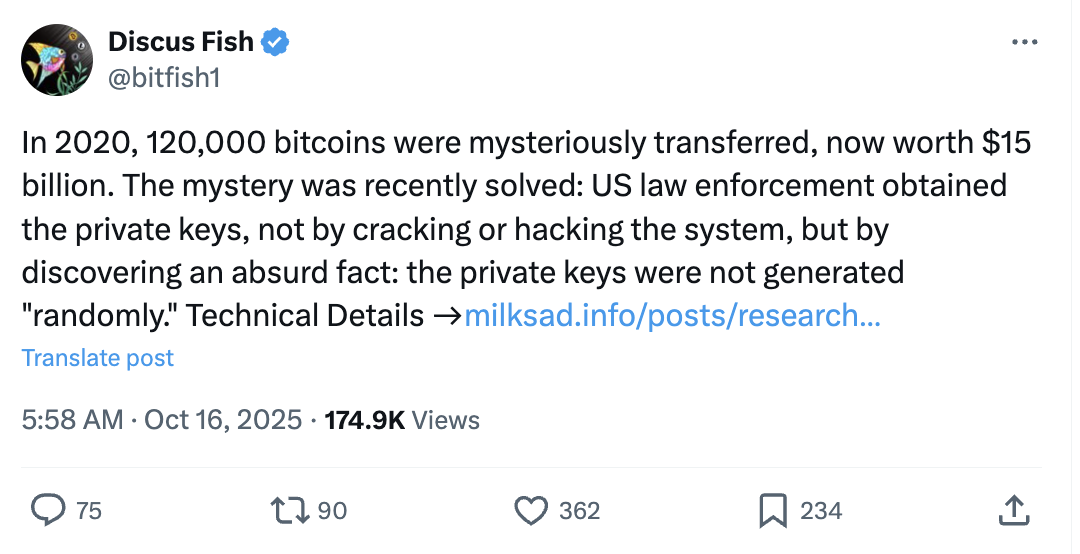220,000 Bitcoin Addresses Vulnerable: US Government Revealed Novel Exploit
A hidden Bitcoin wallet flaw has surfaced after a $15 billion seizure by the US government. With 220,000 wallets exposed, users should act quickly to check their security and abandon compromised addresses.
A new mystery has been solved, as the US government used an unknown exploit to seize Bitcoin wallets. 220,000 wallets are impacted, many of which are still active.
Now that the secret is out, hackers could make attempts to drain these “doomed” crypto addresses. Concerned readers should check the list of vulnerable wallets, and move their tokens as necessary.
A New Bitcoin Wallet Flaw
The crypto community has been full of questions after the US government seized $15 billion in Bitcoin this week. The assets were taken from a known heist in 2020, but sleuths were mystified as to how law enforcement obtained the private keys.
Now, however, one DeFi developer revealed the nature of a new Bitcoin wallet vulnerability:
 A New Bitcoin Wallet Flaw. Source:
Discu Fish
A New Bitcoin Wallet Flaw. Source:
Discu Fish
Apparently, the hacker’s wallets contained a crucial error that made it easy for anyone to steal this Bitcoin. The analyst characterized these wallets as “doomed from the start,” as the Pseudo Random Number Generator that created the private keys had major technical flaws.
Some analysts have even theorized that law enforcement knew about this Bitcoin wallet vulnerability for several years without publicizing it.
Either the government knowingly kept the secret and only revealed it when prosecuting criminals, or someone else discovered it. In that case, the US may have learned of this flaw recently.
A Dangerous Secret
Either way, it’s clear why crypto crimefighters would want to keep this knowledge from general circulation. An estimated 220,000 Bitcoin wallets contain this error, too. Many of these addresses are still active, and it would be trivially easy for hackers to penetrate them.
Readers may wish to check the list to see if their own Bitcoin wallets are vulnerable. If you are storing any crypto in one of these defective addresses, you should move it to safer storage immediately.
BeInCrypto has many resources to help its readers protect their assets, and can recommend solid security plans.
Still, full-blown hysteria might be inappropriate. Prominent sleuths have claimed in unequivocal language that “you will not have this issue if you use a reputable wallet.”
The failed number generation is most common in self-programmed wallets, especially those with AI-generated code.
However, many professionals take wallet security very seriously in their products.
All that is to say, if your Bitcoin wallets come from any leading firm, they’re probably safe. If, however, you’re using an obscure third-party creation or have attempted to generate one yourself, you may not be aware of these serious problems.
The exploit is public, and hackers could come probing at any moment.
Disclaimer: The content of this article solely reflects the author's opinion and does not represent the platform in any capacity. This article is not intended to serve as a reference for making investment decisions.
You may also like
BNY Mellon Empowers Crypto Ecosystem with Robust Infrastructure
In Brief BNY Mellon enhances its crypto ecosystem role through infrastructure services, not its own coin. The bank supports stablecoin projects instead of launching an altcoin amid positive market conditions. BNY Mellon prioritizes infrastructure over token issuance, promoting collaboration and ecosystem strength.

Crypto Surge Revives Investor Optimism
In Brief The crypto market exhibits signs of recovery post-major liquidations. Ethereum, Dogecoin, Cardano, and XRP have shown significant gains. Technological innovations and ETF expectations contribute to market optimism.

Bitcoin ETFs Lose $366 Million While Ethereum ETFs Shed $232 Million in Major Market Outflow

Dogecoin Tests Crucial Support Zone, Charts Indicate Possible Upside Toward $0.86

